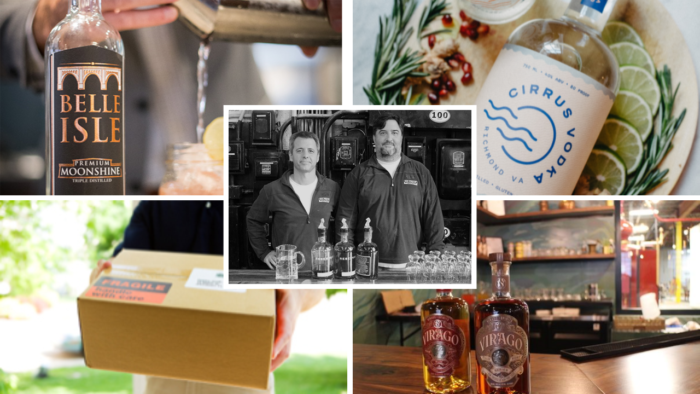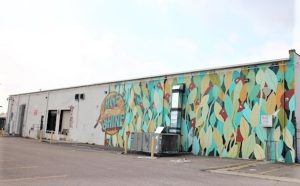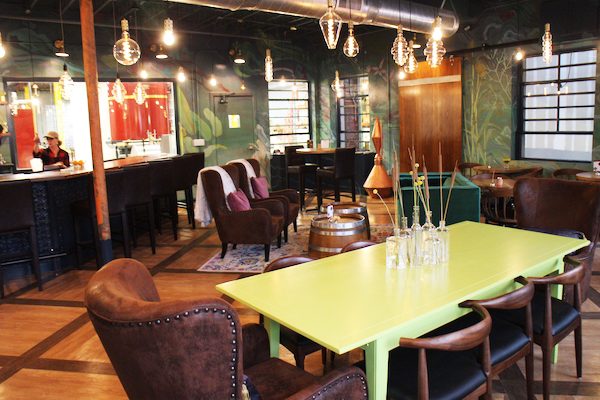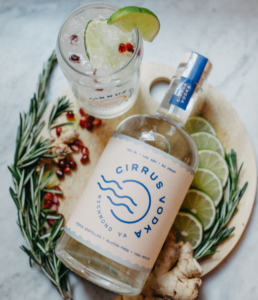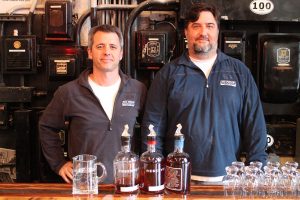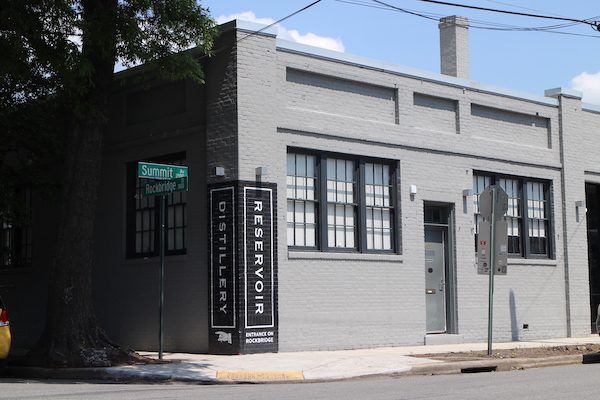A bit of extra regulatory breathing room from loosened ABC restrictions during the pandemic has opened up new, and in some cases potentially business-saving revenue streams, for many local liquor makers.
Distilleries are among the more strictly regulated businesses in Virginia. But during the coronavirus shutdown the Virginia Alcoholic Beverage Control has, on the fly, made it legal for them to sell bottles through local delivery, curbside pickup and shipping across the state.
The measures were implemented in March to help distilleries keep revenue coming in while restaurant sales all but dried up, tasting rooms closed and ABC stores’ hours were reduced.
For Manchester-based Belle Isle Craft Spirits, restaurant sales typically account for about half of revenue. Co-founder Vince Riggi said delivery options have helped fill that void.
“What (the ABC) did has really helped us keep our lights on,” Riggi said. “Without that … I’d say most of the distilleries in Virginia would be in a different place right now.”
It’s a similar story for Cirrus Vodka, which is based near the Diamond. Tom Ellington, director of sales and marketing, said delivery sales even have outpaced the sales the Cirrus tasting room did prepandemic.
“Mondays now outdo what we’d do on Fridays in the tasting room,” Ellington said. “It hasn’t totally filled the hole (left by restaurant sales), but it’s been more than a stopgap. It’s been amazing in terms of reaching new customers.”
ABC data shows that bottles sold to consumers are up significantly compared to this time last year. For example, in May 2019, Cirrus sold 111 bottles out of its tasting room. In May 2020, it sold 740, with over 550 of them through direct delivery.
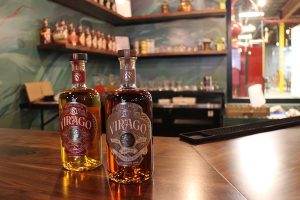
Two of Virago Spirits’ earliest releases, a rum and a port-barrel aged variant. (BizSense file photo)
Virago Spirits, which focuses on bottle and cocktail sales at its tasting room near The Diamond, has seen an uptick as well, albeit less dramatic. In April and May 2019, Virago sold 403 bottles at its tasting room; in that period this year it sold 614.
Under ABC regulations, distilleries from their tasting rooms can sell bottles and serve up to three ounces of spirits to a customer, and over half of the profit of tasting room bottle sales go to the state agency.
Despite the newfound sales, co-owner Brad Haneberg said the loss of higher margins enjoyed from tasting room sales has been tough to swallow.
“Just based on the sheer number of bottles purchased, then yes, we have been selling more bottles than in the past,” Haneberg said. “If you’re talking about profitability, that’s a different story.”
Among local distilleries, Belle Isle and Cirrus have sold the most bottles through delivery and shipment, ABC data shows. Belle Isle sold over 2,300 bottles in May and April; Cirrus sold over 1,700 in that time.
Data collection
Both Riggi at Belle Isle and Ellington at Cirrus said the sales have provided something perhaps more valuable than the revenue: customer information.
“The biggest game changer is the data. I used to just see ABC sales numbers monthly, and see volume go up or go down, but you don’t know who’s buying it. We don’t know anything about them,” Ellington said. “That’s the biggest advantage, I can see if someone buys it again. To be able to remarket to those customers is invaluable.”
Riggi echoed that sentiment.
“It’s 2020 and needless to say, the spirits industry is very much far behind when it comes to e-commerce compared to the rest of the world. This has helped us understand the customers,” he said.
The good news for distillers is that local delivery of spirits is here to stay, an ABC spokeswoman confirmed. The to-go and shipment options are currently allowed indefinitely, and the ABC has not yet decided when or if those privileges will expire.
In the meantime, some local distilleries are using those newfound privileges to try out new products. Jay Carpenter, co-owner of Reservoir Distillery in Scott’s Addition, said the small company doesn’t have the manpower to run local delivery, so it’s trying out “ready-to-drink cocktails to go.”
“We sell them in these glorified Capri Sun pouches,” Carpenter said. “People seem to really like those. We’re also looking into canned cocktails.”
At Virago, Haneberg said they’ve been experimenting with new recipes, and that they’ve even been cooking up some new spirits made from a few unnamed local breweries’ beer that otherwise would have been discarded.
“We’re using the downtime to work with some breweries to distill beer that’s gone bad,” Haneberg said. “They had great stuff that they couldn’t sell. It’s an opportunity for increased R&D time.”
As for the possibility of further deregulation, some distillers are hopeful. Carpenter said Reservoir have gotten calls from people interested in their whiskey on the West Coast, and that he wishes he could ship across state lines. But Riggi said he’s surprised that discussions about regulating the spirits industry in Virginia are happening in the first place.
“Honestly, if you’d asked me in 2019 if this would be even on the radar for 2020, I’d say maybe another five to 10 years,” Riggi said. “We’re just grateful for the empathy and leadership the ABC has provided.”
Haneberg also tipped a cap to ABC nimbleness in the last few months.
“I must admit, I give the ABC credit because they were pretty quick on making some radical changes I never thought we’d see in Virginia,” he said.
A bit of extra regulatory breathing room from loosened ABC restrictions during the pandemic has opened up new, and in some cases potentially business-saving revenue streams, for many local liquor makers.
Distilleries are among the more strictly regulated businesses in Virginia. But during the coronavirus shutdown the Virginia Alcoholic Beverage Control has, on the fly, made it legal for them to sell bottles through local delivery, curbside pickup and shipping across the state.
The measures were implemented in March to help distilleries keep revenue coming in while restaurant sales all but dried up, tasting rooms closed and ABC stores’ hours were reduced.
For Manchester-based Belle Isle Craft Spirits, restaurant sales typically account for about half of revenue. Co-founder Vince Riggi said delivery options have helped fill that void.
“What (the ABC) did has really helped us keep our lights on,” Riggi said. “Without that … I’d say most of the distilleries in Virginia would be in a different place right now.”
It’s a similar story for Cirrus Vodka, which is based near the Diamond. Tom Ellington, director of sales and marketing, said delivery sales even have outpaced the sales the Cirrus tasting room did prepandemic.
“Mondays now outdo what we’d do on Fridays in the tasting room,” Ellington said. “It hasn’t totally filled the hole (left by restaurant sales), but it’s been more than a stopgap. It’s been amazing in terms of reaching new customers.”
ABC data shows that bottles sold to consumers are up significantly compared to this time last year. For example, in May 2019, Cirrus sold 111 bottles out of its tasting room. In May 2020, it sold 740, with over 550 of them through direct delivery.

Two of Virago Spirits’ earliest releases, a rum and a port-barrel aged variant. (BizSense file photo)
Virago Spirits, which focuses on bottle and cocktail sales at its tasting room near The Diamond, has seen an uptick as well, albeit less dramatic. In April and May 2019, Virago sold 403 bottles at its tasting room; in that period this year it sold 614.
Under ABC regulations, distilleries from their tasting rooms can sell bottles and serve up to three ounces of spirits to a customer, and over half of the profit of tasting room bottle sales go to the state agency.
Despite the newfound sales, co-owner Brad Haneberg said the loss of higher margins enjoyed from tasting room sales has been tough to swallow.
“Just based on the sheer number of bottles purchased, then yes, we have been selling more bottles than in the past,” Haneberg said. “If you’re talking about profitability, that’s a different story.”
Among local distilleries, Belle Isle and Cirrus have sold the most bottles through delivery and shipment, ABC data shows. Belle Isle sold over 2,300 bottles in May and April; Cirrus sold over 1,700 in that time.
Data collection
Both Riggi at Belle Isle and Ellington at Cirrus said the sales have provided something perhaps more valuable than the revenue: customer information.
“The biggest game changer is the data. I used to just see ABC sales numbers monthly, and see volume go up or go down, but you don’t know who’s buying it. We don’t know anything about them,” Ellington said. “That’s the biggest advantage, I can see if someone buys it again. To be able to remarket to those customers is invaluable.”
Riggi echoed that sentiment.
“It’s 2020 and needless to say, the spirits industry is very much far behind when it comes to e-commerce compared to the rest of the world. This has helped us understand the customers,” he said.
The good news for distillers is that local delivery of spirits is here to stay, an ABC spokeswoman confirmed. The to-go and shipment options are currently allowed indefinitely, and the ABC has not yet decided when or if those privileges will expire.
In the meantime, some local distilleries are using those newfound privileges to try out new products. Jay Carpenter, co-owner of Reservoir Distillery in Scott’s Addition, said the small company doesn’t have the manpower to run local delivery, so it’s trying out “ready-to-drink cocktails to go.”
“We sell them in these glorified Capri Sun pouches,” Carpenter said. “People seem to really like those. We’re also looking into canned cocktails.”
At Virago, Haneberg said they’ve been experimenting with new recipes, and that they’ve even been cooking up some new spirits made from a few unnamed local breweries’ beer that otherwise would have been discarded.
“We’re using the downtime to work with some breweries to distill beer that’s gone bad,” Haneberg said. “They had great stuff that they couldn’t sell. It’s an opportunity for increased R&D time.”
As for the possibility of further deregulation, some distillers are hopeful. Carpenter said Reservoir have gotten calls from people interested in their whiskey on the West Coast, and that he wishes he could ship across state lines. But Riggi said he’s surprised that discussions about regulating the spirits industry in Virginia are happening in the first place.
“Honestly, if you’d asked me in 2019 if this would be even on the radar for 2020, I’d say maybe another five to 10 years,” Riggi said. “We’re just grateful for the empathy and leadership the ABC has provided.”
Haneberg also tipped a cap to ABC nimbleness in the last few months.
“I must admit, I give the ABC credit because they were pretty quick on making some radical changes I never thought we’d see in Virginia,” he said.
